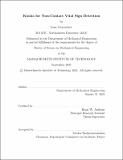Kiosks for Non-Contact Vital Sign Detection
Author(s)
Goryachev, Ivan
DownloadThesis PDF (22.44Mb)
Advisor
Anthony, Brian W.
Terms of use
Metadata
Show full item recordAbstract
Motivated by the COVID-19 Pandemic and its effect on individuals’ baseline vital signs, this work presents a modular hardware and software platform for contact-less vital sign detection. The kiosk is intended collect users’ vital sign data to track changes over time and try to identify periods of illness. It is modular and transportable, able to be deployed and moved quickly, and reconfigured with different sensors if needed. In this implementation, it is instrumented with an infrared thermal imaging camera, FMCW radar sensors, motion and height detection, and ambient climate sensors. The kiosk collects body temperature data and radar-based chest displacement data for offline processing. The algorithms described here show good performance in measuring respiration rate when used with a mechanical chest simulator, but require additional work to properly measure heart rate, due to the low signal-to-noise ratio.
Date issued
2021-09Department
Massachusetts Institute of Technology. Department of Mechanical EngineeringPublisher
Massachusetts Institute of Technology